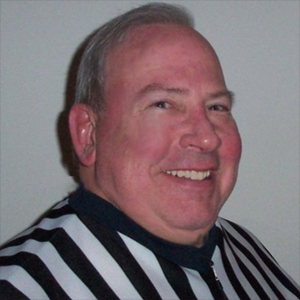
Rndballref
20 Years Experience
Chicago, IL
Male, 60
For twenty years I officiated high school, AAU and park district basketball games, retiring recently. For a few officiating is the focus of their occupation, while for most working as an umpire or basketball referee is an avocation. I started ref'ing to earn beer money during college, but it became a great way to stay connected to the best sports game in the universe. As a spinoff, I wrote a sports-thriller novel loosely based on my referee experiences titled, Advantage Disadvantage
Completely unacceptable. If I was the coach I would lodge my complaint with the referees as soon as it started getting rough. If they continued to fail to enforce the legitimate rules of the game I would be compelled to act. I believe that a coach’s first responsibility is the safety of the players, and if I felt that the team’s safety was at risk I would pull my players off the floor and forfeit the match. Then I would write a commentary along with game tape and get the referees bounced (and decertified) for 1) not enforcing the rules of the game and 2) allowing the environment to threaten the safety of the players. It is hard to believe that state certified officials would let this happen - it is also strange to hear about 3 man crews working middle school games. In the conferences I worked, only high school varsity games used 3 ref’s.
The correct call for this picture is "held ball". Or people call it "jump ball". A held ball is when two opponents are holding the ball together or pushing the ball simultaneously. No foul,call it a jump ball.
A player chest bumped my partner and nearly knocked him over. On the way down, he threw the player out.
You should spend time in 2 places: 1) the library which will have many books about fundamental skill development, and 2) a park where you can hone these skills. If you lack basic skills how are you a starter?
Dating Website Employee
 How does a dating site get its first 10,000 customers?
How does a dating site get its first 10,000 customers?
Antiques Dealer
 Do you think today's "stuff" will one day be collected as valuable antiques?
Do you think today's "stuff" will one day be collected as valuable antiques?
Casting Director
 Are the melt-down auditions on American Idol staged?
Are the melt-down auditions on American Idol staged?
The top and bottom are in bounds, but on a rectangular backboard if the ball goes over the top even without touching, it is out of bounds.
In each half, when an opponent has committed the 7th team foul, the player is awarded a 1 and 1 for non shooting common fouls. When that opponent has committed its 10th team foul the player is awarded 2 free throws for non shooting common fouls.
Regardless of the team foul count on shooting fouls, if the basket was made the shooter gets 1 free throw. If the basket was not made on a shooting foul the shooter is awarded 2 or 3 free throws depending on where the shot was attempted.
Yes the end line official designates the spot to start in.
-OR-
 Login with Facebook
Login with Facebook (max 20 characters - letters, numbers, and underscores only. Note that your username is private, and you have the option to choose an alias when asking questions or hosting a Q&A.)
(A valid e-mail address is required. Your e-mail will not be shared with anyone.)
(min 5 characters)
By checking this box, you acknowledge that you have read and agree to Jobstr.com’s Terms and Privacy Policy.
-OR-
 Register with Facebook
Register with Facebook(Don't worry: you'll be able to choose an alias when asking questions or hosting a Q&A.)